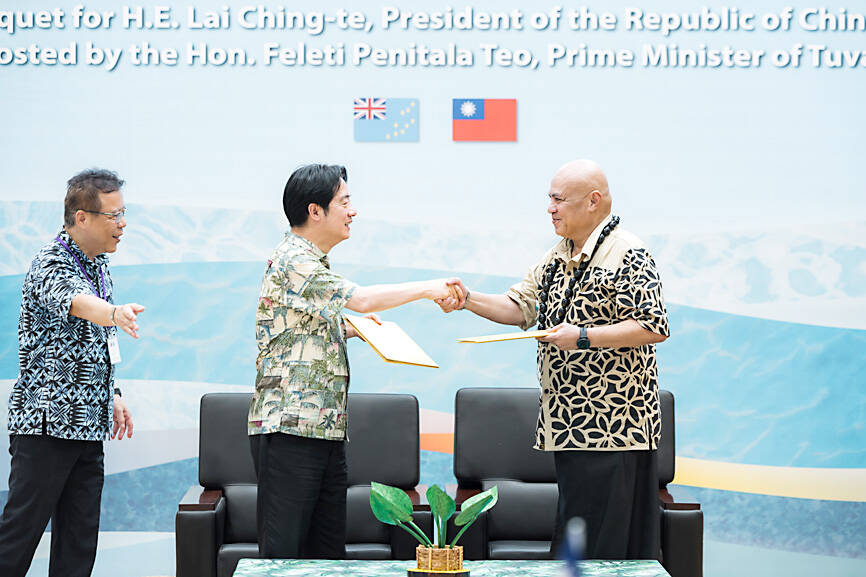President William Lai (賴清德) yesterday arrived in the Pacific nation of Tuvalu, with the two nations signing a joint communique on advancing their partnership.
Lai’s one-day trip to Tuvalu came ahead of a stopover in the US territory of Guam.
Earlier, he was in the Marshall Islands, where Marshallese President Hilda Heine expressed her government’s commitment to “remain a staunch ally” of Taiwan.

Photo courtesy of the Taiwan Presidential Office
Tuvalu and the Marshall Islands are among 12 UN member nations that recognize Taiwan diplomatically.
Lai smiled and waved as he stepped off the plane in Tuvalu, where he was greeted by Tuvaluan Prime Minister Feleti Teo, Governor-General Tofiga Vaevalu Falani, schoolchildren, an honor guard, and a traditional song and dance performance.
“When I disembarked and saw Tuvaluan students waving the national flags of our two countries, I strongly felt the people’s firm commitment to our diplomatic alliance,” Lai said through a translator.
Looking relaxed in a colorful shirt, and with a garland of pink and yellow flowers around his neck, Lai said he hoped Taiwan and Tuvalu can “expand our cooperation to even more areas, thereby further strengthening our diplomatic partnership.”
In a speech, Teo expressed “Tuvalu’s thanks for Taiwan’s contribution” to a pool of funds used by the government to buy a submarine Internet cable, as well as its financial support for climate action.
In a joint communique on “advancing the comprehensive partnership,” the two sides agreed to “reassess the ongoing bilateral cooperation projects in order to establish a more durable, lasting and mutually beneficial diplomatic relations.”
Teo was named prime minister in February, a month after an election that put the nation’s recognition of Taiwan in question.
During the election campaign, Tuvaluan lawmaker Seve Paeniu had floated the idea that the new government could review its Taiwan ties.
That set off speculation about a looming shift in policy, but the new government has vowed to keep up its “special” relationship with Taiwan.
China has expressed anger at Lai’s weekend trip to Hawaii on his way to three Pacific allies.
Lai, who spent the night in Guam, is making what are formally only stopovers.
However, he spent two days in Hawaii, where he met with the governor, gave speeches and visited a World War II memorial.
Security sources told reporters that China could stage new war games around Taiwan as early as this weekend in response to the trip.
Mainland Affairs Council Minister Chiu Chui-cheng (邱垂正) told reporters in Taipei yesterday that Lai’s trip to consolidate friendship with other countries was something that Taiwanese support.
However, “the Chinese communists threaten Taiwan with military hegemony, which I think is something our citizens do not agree with,” Chiu said. “This will only cause cross-strait relations to drift further and further away, and which will not be helpful to ties in the future.”
The international community should take China’s military drills and threats seriously, Chiu added.
Lai is to wrap up his week-long trip tomorrow with a visit to ally Palau.
Additional reporting by Reuters

The combined effect of the monsoon, the outer rim of Typhoon Fengshen and a low-pressure system is expected to bring significant rainfall this week to various parts of the nation, the Central Weather Administration (CWA) said. The heaviest rain is expected to occur today and tomorrow, with torrential rain expected in Keelung’s north coast, Yilan and the mountainous regions of Taipei and New Taipei City, the CWA said. Rivers could rise rapidly, and residents should stay away from riverbanks and avoid going to the mountains or engaging in water activities, it said. Scattered showers are expected today in central and

COOPERATION: Taiwan is aligning closely with US strategic objectives on various matters, including China’s rare earths restrictions, the Ministry of Foreign Affairs said Taiwan could deal with China’s tightened export controls on rare earth metals by turning to “urban mining,” a researcher said yesterday. Rare earth metals, which are used in semiconductors and other electronic components, could be recovered from industrial or electronic waste to reduce reliance on imports, National Cheng Kung University Department of Resources Engineering professor Lee Cheng-han (李政翰) said. Despite their name, rare earth elements are not actually rare — their abundance in the Earth’s crust is relatively high, but they are dispersed, making extraction and refining energy-intensive and environmentally damaging, he said, adding that many countries have opted to

FORCED LABOR: A US court listed three Taiwanese and nine firms based in Taiwan in its indictment, with eight of the companies registered at the same address Nine companies registered in Taiwan, as well as three Taiwanese, on Tuesday were named by the US Department of the Treasury’s Office of Foreign Assets Control (OFAC) as Specially Designated Nationals (SDNs) as a result of a US federal court indictment. The indictment unsealed at the federal court in Brooklyn, New York, said that Chen Zhi (陳志), a dual Cambodian-British national, is being indicted for fraud conspiracy, money laundering and overseeing Prince Holding Group’s forced-labor scam camps in Cambodia. At its peak, the company allegedly made US$30 million per day, court documents showed. The US government has seized Chen’s noncustodial wallet, which contains

SUPPLY CHAIN: Taiwan’s advantages in the drone industry include rapid production capacity that is independent of Chinese-made parts, the economic ministry said The Executive Yuan yesterday approved plans to invest NT$44.2 billion (US$1.44 billion) into domestic production of uncrewed aerial vehicles over the next six years, bringing Taiwan’s output value to more than NT$40 billion by 2030 and making the nation Asia’s democratic hub for the drone supply chain. The proposed budget has NT$33.8 billion in new allocations and NT$10.43 billion in existing funds, the Ministry of Economic Affairs said. Under the new development program, the public sector would purchase nearly 100,000 drones, of which 50,898 would be for civil and government use, while 48,750 would be for national defense, it said. The Ministry of